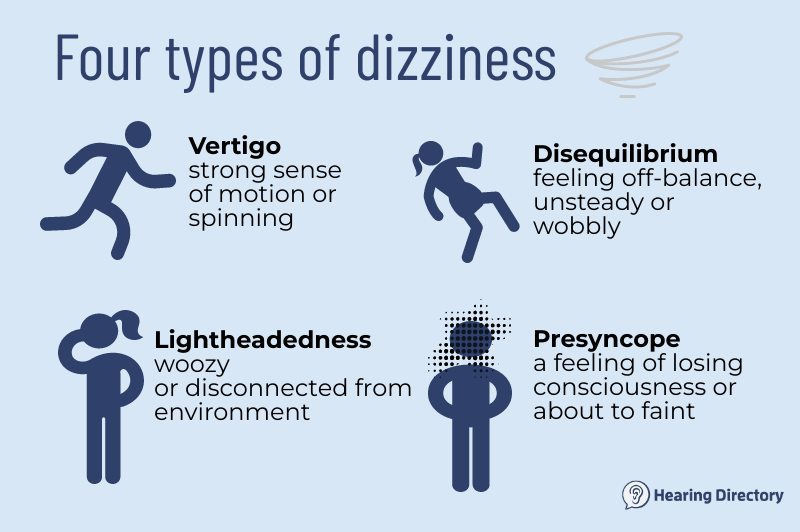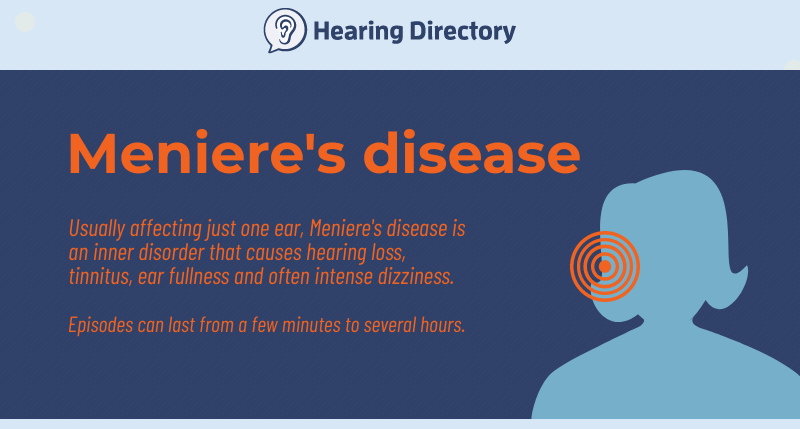|
www.HearingDirectory.ca |
Dizziness and hearing loss
By Jennifer Anderson, BS Ed., MSc., Aud(C), Reg. CASLPO, Audiologist  Reviewed by
Mostafa Eldaebes, M.B.B.Ch, M.Sc, Audiologist, The Centre for Advanced Hearing and Balance Testing at Toronto General Hospital Reviewed by
Mostafa Eldaebes, M.B.B.Ch, M.Sc, Audiologist, The Centre for Advanced Hearing and Balance Testing at Toronto General Hospital Last updated on: August 29th, 2025 Feeling dizzy? Dizziness is one of the most common reasons people visit a doctor. Learn why dizziness happens and how to get the help you need. Key points:
Did you know that dizziness is a general term used to describe a variety of symptoms and is not a disease or diagnosis? It is common, affecting up to a quarter of people at some point in their lives, according to The Canadian Society of Otolaryngology-Head & Neck Surgery. It affects people differently and can be a brief annoyance or significantly impact the quality of your life. It is a sign that something isn’t quite right, but doesn’t necessarily mean there is anything significantly wrong. Our balance system is fascinating and complex. It is our brains that control our sense of balance. To do this, it takes in information from several parts of the body and brain and puts it all together to keep us and our world on an even keel.
Each of these areas have their own complexities. Dizziness can be caused by a problem in one area, a combination of areas, or how the brain is receiving, combining and using the information. What to tell your healthcare providerTracking your symptoms is keyIf we can break down how you’re feeling into more specific types of dizziness, we have a better idea of what’s causing the dizziness and therefore how to treat or manage it. Your healthcare provider can talk to you to help pinpoint if further investigations are needed. The more specific you can be, the better. Dizziness management can be like a puzzle and sometimes we need to rule out what it isn’t while trying to determine what it is. Obviously, when someone is feeling dizzy, they’re not usually focused on the details, just that they’re not feeling well. It’s ideal, once the dizzy sensation has passed, to write down as much as you can recall about the sensation(s), how long it lasted, what you were doing before it happened, if you were sick, if you were able to move, other symptoms you experienced at the same time, etc. It's highly recommended to keep a journal if you experience more than one episode, to track how often they happen and what you experience each time. Types of dizzinessThe most common types of dizziness are listed below. Using these terms instead of the more general "dizzy" can help your healthcare provider figure out what's going on. It’s possible to have more than one of these at the same time or during different episodes:
Hearing loss, tinnitus and dizzinessBecause balance and hearing are connected in the inner ear, changes in one can affect the other. It’s important to let your provider know if the dizziness is accompanied by any hearing changes such as hearing loss or tinnitus (noises in the ears or head). Meniere's disease
In fact, if you are experiencing hearing loss, tinnitus, ear fullness, and dizziness (typically vertigo) at the same time, it could be Meniere’s disease. Meniere's disease is a specific disease that affects both hearing and balance. It’s a rare condition, with an incidence rate average of about 1 in 1000 or approximately 0.1% of the Canadian population1. It is best monitored with the help of an ear, nose and throat (ENT) doctor. Common causes of dizzinessSome of the more common causes of dizziness are listed below, but the list is not exhaustive.
Depending on the suspected cause of your dizziness, your doctor may order further investigations or consultations with related specialists. Audiologists in particular are well-suited to help diagnose, assess and treat some hearing and balance problems that don't need an ENT referral.Treatment and management are more effective when we know what is causing your symptoms. Sources- Canadian Family Physician. Approach to Ménière disease management. 65(7), 463-467. Jennifer Anderson, BS Ed., MSc., AudiologistContributing author Jennifer Anderson is an experienced audiologist, having practiced for over 20 years in a variety of clinical and managerial settings. She graduated with a master’s degree in audiology from the University of Southampton, UK. Her experience includes working in diagnostics, pediatrics, tinnitus, vestibular/balance, and aural rehabilitation at several teaching hospitals. Since moving to Canada in 2006, she has worked with all age groups, both diagnostically with ENT colleagues, and in providing rehabilitation. She has taught at Georgian College in Barrie and is currently an elected council member at the College of Audiologists and Speech Language Pathologists of Ontario. She very much enjoys her regulatory work and is an advocate for patients’ rights and high-quality patient care.
You are reading about: Related topics
More information about hearing aids. Featured clinics near me
Schedule a hearing test with Healthy Hearing. Find a clinicThe Healthy Hearing Report |
|
www.HearingDirectory.ca |
Dizziness and hearing loss
By Jennifer Anderson, BS Ed., MSc., Aud(C), Reg. CASLPO, Audiologist  Reviewed by
Mostafa Eldaebes, M.B.B.Ch, M.Sc, Audiologist, The Centre for Advanced Hearing and Balance Testing at Toronto General Hospital Reviewed by
Mostafa Eldaebes, M.B.B.Ch, M.Sc, Audiologist, The Centre for Advanced Hearing and Balance Testing at Toronto General Hospital Last updated on: August 29th, 2025 Feeling dizzy? Dizziness is one of the most common reasons people visit a doctor. Learn why dizziness happens and how to get the help you need. |
 Are you located in the United States?
Are you located in the United States?



